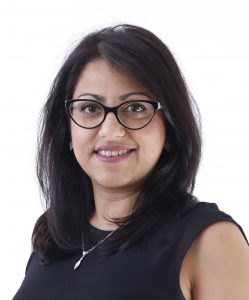A group of pioneering female endoscopists is spearheading a push to bring gender equality to the male dominated sub-specialty.

Clinical Associate Professor Payal Saxena is leading a push for gender equity in the sub-specialty of endoscopy.
For the first few years working as an endoscopist, Payal Saxena was “oblivious”.
Having worked as an engineer before re-training in medicine, she was used to being surrounded by men in the workplace.
But after continually turning up to endoscopy meetings to find herself one of the only women in the room, the realisation dawned that the sub-speciality she had chosen was a path few women take.
And she began to question why.
“At the moment there is about a 50-50 split of female and males graduating from medical school, and in gastroenterology there is about 19-20% females,” says Clinical Associate Professor Saxena, a consultant gastroenterologist at Royal Prince Alfred Hospital in Sydney.
“But if you look at interventional endoscopy, there is an extremely low proportion of females. You can see it when you go to endoscopy conferences. There are very few females represented as speakers, panellists or doing live cases. It’s a very small percentage, you’re looking at less than five per cent.”
Figures from the Australian Taxation Office show females make up a quarter of the gastroenterology workforce, one of the lowest rates of female participation across the physician specialties.
Professor Saxena is the first to admit her data is anecdotal, as she is not aware of any official figures on the proportion of women working primarily in endoscopy.
But the situation was brought home last year when she was tasked with arranging the endoscopy portion of AGW 2018, as part of her role with the GESA Australian Gastrointestinal Endoscopy Association (AGEA).
“Unfortunately there were not too many women to invite. It was all males, the couple of women I know that are involved were not available this year, aside from that there’s just not that many to ask.”
Overseas in Asia, Professor Saxena’s colleagues have been noticing the same thing.
And when they meet up at conferences, the conversation often turned to the lack of female representation in endoscopy – what it means for their own careers and for the future of the profession.
So in 2014, Professor Saxena and two colleagues from Thailand and Malaysia decided to do something about it.
They founded the group Women in Gastroenterology Network Pacific (WIGNAP).
The group’s principle aim is to create a professional networking platform for female gastroenterologists in Asia, developing opportunities for training, mentoring and leadership.
The group has another goal: to promote gender equality in gastroenterological medicine.
Since forming, WIGNAP has held meetings at international endoscopy conferences across Asia, hosting talks, networking sessions and hands-on training.
“It gives women a formal forum to speak up about their concerns and find colleagues who they can form interstate or international relationships, whether they be friendships, mentorships, or networking for research projects.”
A key part of the campaign involves engaging female doctors at the point where they’re considering which area to specialise in.
“When the junior doctors don’t see female representation in these fields they automatically think ‘this is not for me’ and don’t take that direction. Sometimes it can feel a little bit like a boys’ club.”
But the problem of lack of female representation in gastroenterology and endoscopy has tended to go ignored, she says.
“We haven’t really spent a lot of time recognising or addressing the problem.”
While there seems to be more females entering the profession, they are pursuing other sub-specialties like IBD or hepatology, rather than endoscopy, she says.
“If there’s any lack of leadership or role models that is preventing them, I’d hope to get rid of that negative feeling.”
Now in its fifth year the campaign is starting to bear fruit, Professor Saxena says. Raising awareness through networking and mentoring for junior doctors has helped.
“In the last year or two I’ve had quite a few junior doctors approach me about a career in endoscopy so that’s been nice.”
But for it to succeed, the campaign needs male gastroenterologists to be on board championing the cause, she says.
“It can’t just be just women fighting, it’s got to be men and women wanting the change,” she says.
“That’s something that’s very obvious in my department, with our director of endoscopy and head of department.
“I think having that support from other men is crucial for female empowerment and eventual gender equality.”
For more information about WIGNAP contact:
Payal Saxena [email protected]
Sharmila sachi sharmilasachi68@gmail.
Nonthalee Pausawasdi nonthaleep7@gmail.